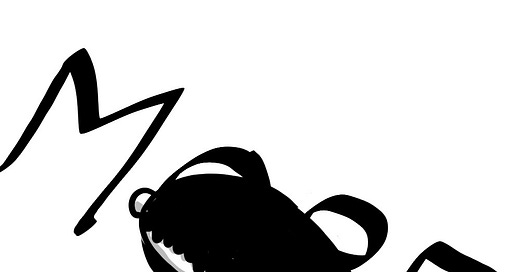It’s not unknown for this newsletter to go off on various tangents,1 but the central core is always in the name: Write More.
While I do occasionally stray into how to write good fiction, it’s not my focus. There are plenty of teachers and authors who are far better positioned than me to help you improve your writing, in terms of its artistic quality.
There’s a missing piece of the puzzle, though. You can go to university and study creative writing, take endless online courses, read all the classic books about writing — but none of it is going to make a difference if you’re not actually doing the writing.
Hence, this newsletter. Write More. Before you can even think about being a good writer, you have to become a writer. And the nifty truth is that by writing more, you will inevitably improve your skills.
This is something I’ve poked at in the past, when I foolishly thought it would be a good idea to calculate how many hours I’ve spent writing:
10,000 hours
A friend recently reminded me of the ‘10,000 hours’ concept. The idea is that to become expert in any subject you need to actively do it for at least 10,000 hours.
But we’ve always been told that less is more, right? Quality is more important than quantity.
But they always say “less is more”
If you’ve already built up a good writing habit, you get the luxury of being particular about which words you’re putting down. You can pick and choose and aim to make every sentence exquisite.
At any point prior to that, less is simply less.2 Quality is always going to be important, of course, but if your quantity = zero, it’s all academic. Obsessing over the perfect sentence can be satisfying, but not if it prevents you from finishing the sentence.
It has to be in this order:
Write
Write better
You can’t do #2 without first doing #1, and trying to leap ahead to #2 can be a paralytic. There will always be better writers than you (and worse writers), but worrying about not being as good as them isn’t going to help. In fact, your future self is a better writer than you, and the only way to catch up is to keep writing.
Forming a habit
The way to form a habit is to keep doing something until it’s easy. Until you don’t even think about it.
Easier said than done (unless it’s a bad habit, in which case it’s irritatingly simple). The trick for me was to try serial fiction, and publishing my work online, live to the page. It’s an approach that requires a more relaxed approach to the work, while also building in a release schedule.
Before I started publishing my work online, I’d write sporadically and would often abandon projects. Since I started serialising, back in 2015, I’ve published a new piece of fiction every single week. That’s a lot of words! I’m a much better writer now than I was in 2015, but if I hadn’t committed to writing and publishing my first serial, A Day of Faces, I’d never have got started on that improvement.
Writing a new chapter every week felt like an impossible task at first. By the end of that first book, it had become part of my week. In 2021 I started writing this newsletter, adding another piece of writing to my weekly output: again, it seemed impossible, until I built the habit. I don’t even think about it now.
Habits are powerful (and potentially dangerous, obvs), in that they turn things which previously seemed near-impossible into routine occurrences.
Practice leads to confidence
I used to have a real fear of sharing my work. At university, I had to read out a short story to the group and receive feedback: it was utterly terrifying. Almost everything I’d written outside of school assignments had stayed behind closed doors, like dirty little secrets, and allowing any of it out into the world seemed dangerous and risky.
Writing a weekly serial forced me out of that thinking. Sharing my work is now a regular and obvious thing to do. I’m more confident in what I write, and also less bothered about what others think. That crippling self-consciousness has gone away.
That only happened through writing a lot, and publishing it to the world.
If I was still tinkering quietly in my room by myself, with my work confined to notebooks and hard drives, I’d be in a much less happy place.
It’s not just confidence: consistent writing also helps to develop a personal style, which is something I only really reached after a significant amount of produced work. Developing style is a weird alchemy, hard to pin down or force: it just happens over time.
Quantity leads to quality
Quantity isn’t the endgame, obviously. It’s a way of getting started, of building a regular habit that you can then use to hone your writing into something exciting. Over time, you’ll find your natural rhythm.
But that’s the thing about any craft: however else you approach it, one of the biggest contributing factors to your skill and satisfaction is the amount of time you commit The more you do it, the better you’ll get. Reading books, studying, taking courses — all of those are multipliers that can accelerate your improvement, but none of them will work without doing the writing itself.
One day, you’ll realise that the habit has been built. Maybe you’re writing every day, or once a week, or a few times per month. It doesn’t really matter, as long as you’re getting the words down.
Caveat #1: Don’t set impossible goals
When I suggest that writing more is a vital part of becoming a better writer, I don’t mean that you have to write every day, or hit an ambitious daily word count.
I tend to favour the exact opposite, which could seem a little contradictory here. Big targets I don’t tend to find compatible with free creativity. If I have to hit 1,500 words every day, I freeze up and either write less or feel massively stressed. I prefer to set a comfortable time goal instead, such as ten minutes per day. In practice, those easy 10 minutes tend to turn into half an hour, or an hour, while remaining fun and loose. There’s no associated word count: if I write nothing at all, that’s fine, as long as I’ve spent 10 minutes thinking about the work.
Over time, having relaxed targets will, in my experience, result in higher achievement — at least in the specific case of creative writing. The aim here is to write consistently, not to burnout.
Caveat #2: Beware the churning slop
At some point, quantity will tip over into being a negative force. If you’re releasing a new ebook on Amazon every month, there’s a very good chance the grind is reducing the quality of your novels (or the quality of your mental health).
The key to remember is that quantity is not the end goal. By prioritising quantity above all else, you stop being a writer and end up as a content producer. You’re just producing more stuff.
Remember, you’re here to write short stories, or novels, or novellas, or screenplays, or songs. You’re not just making generic content. Don’t let the streaming services and the insatiable appetite of platforms like YouTube convince you otherwise.
The quantity that I’m talking about is a means to an end, and that end is still quality.
Anyway, I just wrote an unnecessary number of words all about writing more. Which I suppose is appropriate.
Meanwhile.
Did you know I also write fiction? I’m not just making this up.3 I don’t link to it as often as I probably should, so let’s do that. It’s honestl the best way for you to decide if my ‘advice’ is worth listening to! You can find out how to jump on board my current serial here:
Tales from the Triverse story index
A weekly dose of science fiction, fantasy and detective fiction. Pick from individual stories or read the whole thing from the beginning.
It’s free to read at the moment and there’s a lot of it, so you’re getting a huge collection of scifi/fantasy/detective stories. If you’d prefer an ebook download, you get that as part of a paid subscription.
Other bits:
I’m reading Bird by Bird by Anna Lamott. It is good, from what I’ve dipped into so far. There are lots of books on writing, but this one has a wry wit that I’m appreciating.
The 12 year old is playing Spider-Man 2 on Steam. I’m watching over his shoulder and noting how the action sequences, visually, are quite a bit more satisfying than most of what goes down in the Marvel Spider-Man movies. Why is the action direction so good in (some) games compared to blockbuster movies?
My D&D group have been taking a slight break and trying Eat the Reich. In short, you’re a team of vampire commandos sent into World War 2 Paris to drink Hitler’s blood. It’s fast, fun, stripped-back and highly satisfying. The system encourages quick thinking and improvisation. It enables excellent group storytelling, and as a bonus you get to punch Nazis.
Right, have a good week. I’ll be back on Friday with a new Triverse chapter, and on Wednesday for the hardcore who are rewatching Babylon 5 with me.
Thanks for reading.
lol
When I overuse a word, it starts to lose its meaning. ‘Less’ is now clearly a very weird word.
I mean, no more than anyone else, that is.








I think in terms of writing consistently vs. writing more. Anytime we commit to writing is time well spent. For a long time I had a goal of writing 15 minutes per day. Many days I wrote more than 15 minutes and I never tracked things like word count. It was showing up to write that makes the difference. Also, as writers we need to read as much as we can. I'm a huge fan of audiobooks and this is a way for me to consume a lot more writing than I could otherwise.
Another lesson many writers learn is there's a point that we switch from reading craft books on writing to just reading good writing. I've read a ton of craft books and my bookshelf is crammed with these wonderful books. I'm at the point now where I read like a writer and study what other authors do well and what they do poorly. Another thing I do now after ten years of writing seriously is pay for editorial help. A good editor can teach any writer how to improve their writing better than any book.
Simon, thanks for your regular articles and encouragement.
Brilliant summary, Simon. 👍
I swallowed the “You have to write Xk words a day” advice, and tried so many versions… fill three pages, write pointless stream of consciousness stuff after you run out of current ideas, add that amount to your novel… They were all stressful. What I produced was usually bad. I always burned out quickly, stopped writing at all for a while, and felt terrible for failing.
Setting a time limit doesn’t work for me with writing (I find myself just staring blankly at the clock 😅) but I found setting a word limit does. Rather than “at least 2000 words” I flipped it to “maximum 500 words” and suddenly the stress is off! Because any amount counts.
Ideally my daily microfiction is a warmup and I then pivot to working on my novel. But my worst case scenario is that I wrote and published *something* today. And yeah, some of those things will be bad, that’s just how it goes. But they’re all fun learning experiences. 😄